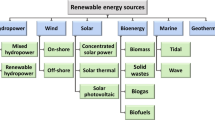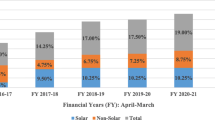Abstract
Renewable Energy (RE), a key form of energy to the universe's growth, is being focus of the current development scenario of the globe. The demands of energy coupled with rising international commitments for reducing emissions are key drivers for the development of policies and research. This paper analyses shifting policy focus on RE development in India. Though the per capita demands are marginally rising, the growth of per capita RE is found substantial. The exponential growth of Solar and Wind Energy in the country is supplemented by favorable policy instruments therein. The limited resources and time restrict the overall analysis toward more personal and empirical interactions. The review is an outcome of assessing the barriers for RE development in India suggesting requirements of comprehensive modeling for achieving long term energy goals. The findings suggest interesting development in RE policy focus and outlook of the researchers in the country. The recommendations arising out of the policy analysis show that involvement of stakeholders, demand forecasting, adaptable instruments for promotion, technology efficiency and behavioral adaptation are key to future of RE. This would enhance the understanding of the development of research in renewables policy and provide scope for outlining the gaps in the sector for achieving 40% RE installed capacity.

Similar content being viewed by others
Abbreviations
- RE:
-
Renewable energy
- B:
-
Billion
- TWh:
-
Terra watt hour
- CBD:
-
Convention on Biological Diversity
- UNFCC:
-
United Nations Framework for Climate Change
- COP:
-
Conference of parties
- GDP:
-
Gross domestic product
- INDC:
-
Intended Nationally Determined Contributions
- MNRE:
-
Ministry of New and Renewable Energy
- NISE:
-
National Institute of Solar Energy
- NIWE:
-
National Institute of Wind Energy
- SSS-NIBE:
-
Sardar Swaran Singh-National Institute of Bio-Energy
- SECI:
-
Solar Energy Cooperation of India
- IREDA:
-
Indian Renewable Energy Development Agency
- NITI:
-
National Institution for Transforming India
- DAE:
-
Department of Atomic Energy
- CERC:
-
Central Electricity Regulatory Commission
- CEA:
-
Central Electricity Authority
- BEE:
-
Bureau of Energy Efficiency
- NHPC:
-
National Hydro Power Corporation
- PFC:
-
Power Finance Corporation
- POSOCO:
-
Power System Operation Cooperation Ltd
- NEEPCO:
-
North Eastern Electric Power Corporation Limited
- IEX:
-
India Energy Exchange Ltd
- IPCC:
-
International Panel on Climate Change
- GHG:
-
Green House Gas
- GIS:
-
Geographic Information System
- HDI:
-
Human Development Index
- NAPCC:
-
National Action Plan for Climate Change
- USA:
-
United States of America
- UNDP:
-
United Nations Development Programme
- GEF:
-
Global Environmental Facility
- BERI:
-
Biomass Energy for Rural India
- kWe:
-
Kilowatt electric capacity
- CDM:
-
Clean Development Mechanism
- CERs:
-
Certified Emission Reductions
- IAM:
-
Integrated assessment models
- IPA:
-
Impact Pathway Analysis
- RPO:
-
Renewable Purchase Obligations
- SDG:
-
Sustainable Development Goals
- MW:
-
Megawatt
- GW:
-
Giga watt
- NNBOMP:
-
New National Biogas and Organic Manure Program
- Mt:
-
Million tons
- IEA:
-
International Energy Agency
References
N. Stern, S. Peters, V. Bakhshi, A. Bowen, C. Cameron et al., Stern Review: The Economics of Climate Change (HM Treasury, London, 2006), p.679
United Nations world population prospects, statistics.com/demographics/world-population. php (2021)
Global Energy Review 2021, P-3, Assessing the effects of Economic recoveries on Global energy demand and CO2 emissions in 2021 (2021)
Global Energy Review 2020, The impact of COVID-19 crisis on Global Energy demand and CO2 emissions, p. 4 (2020)
Y. Hu, Y. Chen, S.-H. Wu, Synergy between the convention on biological diversity and the UNFCC in CHINA. Adv. Clim. Change Res. (2021). https://doi.org/10.1016/j.accre.03.011
Article 4, United Nations Framework Convention on Climate Change (1992)
Status of ratification of the convention, UNFCC.int/process-and-meetings/30.01.2022
A discussion paper on India’s Intended Nationally Determined Contributions (INDCs), a civil society perspective (2015)
Ministry of New and Renewable Energy, Government if India, Annual Report, 2020–2021.
Energy Policy Review, International Energy Agency; India (2020)
Mercados EMI, Preparing a roadmap for implementing energy efficiency portfolio obligation in India Mercados Energy Market India, New Delhi (2010)
Inter Governmental Panel on Climate Change (IPCC), Technologies, policies and measures for mitigating climate change (1996)
S. Paul, R.N. Bhattacharya, Causality between energy consumption and economic growth in India: a note on conflicting results. Energy Econ. 26(6), 977–983 (2004)
T.V. Ramchandra, B.V. Shruti, Spatial mapping of renewable energy potential. Renew. Sustain. Energy Rev. 11, 1460–1480 (2007)
S. Manish, I.R. Pillai, R. Banerjee, Sustainability analysis of renewables for climate change mitigation. Energy Sustain. Dev. 10(4), 25–36 (2006)
D.M. Martinez, B.W. Ebenhack, Understanding the role of energy consumption in human development through the use of saturation phenomena. Energy Policy 36, 1430–1435 (2008)
National Action Plan on Climate Change (NAPCC), Government of India (2008)
D. Pimentel, Energy inputs in food crop production in developing and developed nations. Energies 2, 1–24 (2009)
P.R. Shukla, S. Dhar, J. Fujino, Renewable energy and low carbon economy transition in India. J. Renew. Sustain. Energy 2, 031005 (2010)
A. Kumar, K. Kumar, N. Kaushik, S. Sharma, S. Mishra, Renewable energy in India: current status and future potentials. Renew. Sustain. Energy Rev. 10, 2434–2442 (2010)
R. Singh, Y.R. Sood, Current status and analysis of renewable promotional policies in Indian restricted power sector—A review. Renew. Sustain. Energy Rev. 15, 657–664 (2011)
M.C. Mabel et al., Analysis of reliability aspects of wind power. Renew. Sustain. Energy Rev. 15, 1210–1216 (2011)
S. Dasappa, D.N. Subbukrishna, K.C. Suresh, P.J. Paul, G.S. Prabhu, Operational experience on a grid connected 100 kWe biomass gasification power plant in Karnataka, India. Renew. Sustain. Energy Rev. 15, 231–239 (2011)
H. Nautiyal, Progress in renewable energy under clean development mechanism in India. Renew. Sustain. Energy Rev. 16, 2913–2919 (2012)
J.C. Steckel, R.J. Brecha, M. Jackob, G. Luderer, Development without energy? Accessing future scenario of energy consumption in developing countries. Ecol. Econ. 90, 53–67 (2013)
R. Dhingra, A. Jain, A. Pandey, S. Mahajan, Assessment of renewable energy in India. Int. J. Environ. Sci. Dev. 5(5), 459–462 (2014)
Sen S., Ganguli S., Das A., Sen J. Dey S., Renewable energy scenario in India: opportunities and Challenges. African Earth Sci. (2015)
Thomas B.H., Benefits, barriers and opportunities for renewable energy outreach in extension: a mixed methods needs assessment. All graduate these and dissertations 4750 (USU, 2016)
A. Rabi, J.V. Spadaro, External costs of energy: how much is clean energy worth? J. Solar Energy Eng. 138, 040801 (2016)
S. Thapar, S. Sharma, A. Verma, Economic and environmental effectiveness of renewable energy policy instruments: best practices from India. Renew. Sustain. Energy Rev. 66, 487–498 (2016)
J.J.D. Nesamalar, P. Venkatesh, S.C. Raja, The drive of renewable energy in Tamilnadu: status, barriers and future prospect. Renew. Sustain. Energy Rev. 73, 115–124 (2017)
United Nations Development Programme, UNDP support to the implementation of Sustainable Development Goal 7: Affordable and Clean Energy; Available at United Nations Development Programme website, New York (2016)
W.G. Santika, M. Anisuzzaman, P.A. Bahri, G.M. Shafiullah, G.V. Rupf, T. Urmee, From goals to joules: a quantitative approach of interlinkages between energy and the Sustainable Development Goals. Energy Res. Soc. Sci. 50, 201–214 (2019)
T. Schittekatte, L. Meeus, T. Jamasb, M. Llorca, Regulatory experimentation in energy: three pioneer countries and lessons for the green transition. Energy Policy 156, 112382 (2021)
R.M. Elavarasan, G.M. Shafiullah, S. Padmanabhan, N. Manoj Kumar, A. Annam, A.M. Vetrichelvan, L. Mihet-Popa, J.B. Holm-Nielsen, A Comprehensive review on renewable energy development, challenges, and policies of leading Indian states with an international perspective. IEEE Access 8, 74432–74457 (2020)
J.C.R. Kumar, M.A. Majid, Renewable energy for sustainable development in India: current status, future prospects, challenges, employment, and investment opportunities. Energy Sustain. Soc. 10, 2 (2020). https://doi.org/10.1186/s13705-019-0232-1
International Energy Agency (IEA), India Energy Outlook 2021; World Energy Outlook; special report (2021)
Derived from Census of India: https://www.worldometers.info/world-population/india-population/ (2021)
India: Gross domestic product (GDP) in current prices from 1986 to 2026(in billion U.S. dollars) (2021)
Energy demand od India: Ministry of New and Renewable Energy Annual Reports- 2020–2021
Growth of installed capacity – mode wise utilities only, All India Electricity statistics; General Review CEA (2021)
Ministry of New and Renewable Energy Annual Reports: Page 2 Table 1; 2020–2021.
Renewable Energy report, India Brand Equity Foundation (IBEF) (2021)
Funding
No funding is received to conduct this research work.
Author information
Authors and Affiliations
Corresponding author
Ethics declarations
Conflict of interest
On behalf of all authors, the corresponding author states that there is no conflict of interest.
Additional information
Publisher's Note
Springer Nature remains neutral with regard to jurisdictional claims in published maps and institutional affiliations.
Rights and permissions
Springer Nature or its licensor (e.g. a society or other partner) holds exclusive rights to this article under a publishing agreement with the author(s) or other rightsholder(s); author self-archiving of the accepted manuscript version of this article is solely governed by the terms of such publishing agreement and applicable law.
About this article
Cite this article
Joshi, A.K., Negi, C.M.S. Instruments for Addressing Climate Change in Renewable Energy Policy of India: A Review of Developments in Policy Research. J. Inst. Eng. India Ser. C 105, 233–240 (2024). https://doi.org/10.1007/s40032-023-01004-0
Received:
Accepted:
Published:
Issue Date:
DOI: https://doi.org/10.1007/s40032-023-01004-0




